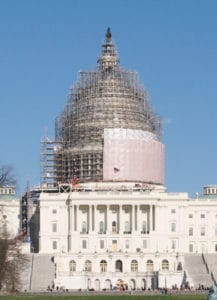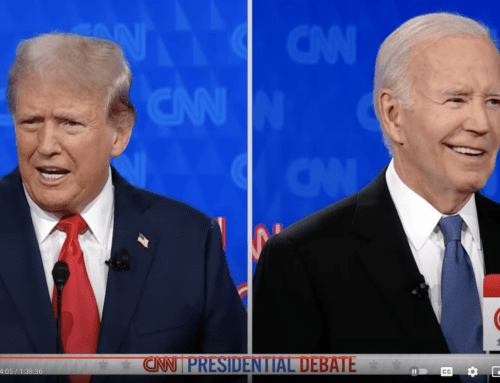
The country’s soaring national debt is not just a testament to our lack of fiscal responsibility but also a reflection of our loss of national identity. Fixing the debt problem so that it no longer threatens a national economic crisis is an opportunity to reassess our priorities and reassert who we want to be as a nation.
As the culture war has steadily divided Washington over the last three decades, it has left our elected officials almost entirely incapable of agreeing to even minor shifts in tax and spending policies. They are unable to reasonably manage the government’s finances and convey to the country and the rest of the world a coherent sense of national purpose. Increasingly overt efforts to subvert the smooth functioning of government by some radical Republicans in Congress, egged on by former and potentially future President Donald Trump, have only heightened tensions around the federal budget and the debt, as illustrated by last year’s protracted debt ceiling showdown and tumultuous budget negotiations.
And yet, amid this political disarray, the people at the Committee for a Responsible Federal Budget recently offered us a reason to be optimistic. Mike Murphy, a senior vice president of the fiscal watchdog organization, expressed his group’s hope that last year’s policymaking, such as it was, might be an important turning point in the struggle to re-establish control over the national debt. The Committee noted that Congress and the White House executed policies in 2023 that could slow the growth of the debt by $1.3 trillion over the next 10 years – but only if the lawmakers and presidents in office during that time remain committed to carrying out the promised (but unenforceable) spending restraints called for in the law that broke the debt limit impasse.
That’s a big “if “, but there is support in and out of Congress for establishing a bipartisan commission to come up with recommendations to improve the government’s fiscal outlook. While it’s still a longshot that such a commission will be established and then deliver a plan that Congress would enact, it is a good time to consider what such a plan might look like. After all, a successful federal budget should be carefully and reasonably constructed to reflect the country’s values and its priorities.
The question is, where do we begin that process? The culture war defined the two polar extremes and has seemingly left little room for negotiation. On one side are the conservative warriors who long ago rebelled against their own party’s idea of good government in favor of shrinking the size of the federal government and limiting its ability to shape American life. On the other side are the liberal warriors who continue to advocate for expanding the government’s role to regulate big business and provide all Americans in need with economic and social support. This has translated into budget discussions in which increasing revenue by raising taxes is a non-starter (in the right’s view, more revenue would only feed the administrative state that it wants to dismantle) and cutting spending on the two most costly programs, Social Security and Medicare, is unthinkable (in the left’s view, it would unnecessarily reduce the income and access to healthcare for many less privileged Americans).
As the nation grapples with an increasing national debt, the cost of running the federal government is often called into question. Although many politicians have sought to cut spending by eliminating federal agencies and specific programs, few have succeeded in any significant way. This is because many agencies and their programs continue to perform the vital functions for which they were created.
Fortunately, there are a number of nonpartisan though ideologically varied organizations concerned that the size of the national debt is a threat to the country’s economic and national security. Their diversity of priorities and recommendations for controlling and eventually reducing the debt provide an effective starting point for the work of a possible fiscal commission. And given that the bill proposed in Congress calls for the new commission to make its report in 2025, there is a chance its final recommendations would not suffer the same fate that befell the recent immigration bill, which so clearly succumbed to election year politics.
Two of these organizations exist because of fears that a debt allowed to grow uncontrollably is a risk to the nation: the Committee for a Responsible Federal Budget and the Peter G. Peterson Foundation, whose founder began his campaign to rein in the debt around the same time that the Committee was formed in 1981. Both groups have prioritized reform of the Social Security and Medicare trust funds and question the efficacy of the tax code.
The Committee has noted that the Trump tax cuts of 2017, which are set to expire in 2025, have added $1.9 trillion to the debt. At the same time, it has expressed concern that extending them for another decade would add another $3.3 trillion. Both the Committee and the Peterson Foundation also see tax expenditures, commonly known as tax breaks, as a key driver of the debt; through such expenditures the government returns money to individuals, families, and corporations in the form of subsidies and tax credits. Employer-provided health insurance is the largest tax expenditure – it is a form of compensation that is excluded from the employee’s taxable income. In 2023, total tax expenditures exceeded the cost to operate any of the three biggest government spending drivers: Social Security, Medicare, and the Department of Defense.
Other organizations, rather than looking at the debt strictly from a numbers perspective, emphasize different cultural priorities. Here is a small sample, chosen for their diversity of ideas:
- Center on Budget and Policy Priorities: The group’s mission is to build “a nation where everyone has the resources they need to thrive and share in the nation’s prosperity.” It prioritizes tax increases for the rich, tax credits for the poor, and more funding for the IRS so that it can crack down on tax evasion by rich people and big businesses.
- National Priorities Project: The organization advocates for a budget that reflects the priorities of “peace, shared prosperity, and economic security for all.” As part of its commitment to see military spending reduced, the group opposes providing more military aid and weapons to Israel since the Hamas attack on Gaza, has argued that the national security budget should include funding to combat climate change, and generally says that “militarized spending has done far more harm than good, while our consistent under-investment in human needs has made us much less safe.”
- Patriotic Millionaires: This is a group of wealthy Americans – those with annual income above $1 million – concerned by historic levels of economic inequality and the destabilizing impacts of concentrated wealth and political power on American democracy. The group supports increasing income tax rates for the wealthy, eliminating income tax payments for people not earning a “cost of living” wage (similar to the MIT Living Wage Calculator), and creating a wealth tax for the ultra rich (currently those with incomes greater than $140 million).
- Tax Foundation: This business-friendly organization puts a premium on tax policies that could drive economic growth and improve our global competitiveness. Its priorities include extending the Trump tax cuts indefinitely and reducing mandatory spending on Social Security and Medicare. In general, the group says taxes should not “favor or punish specific industries, activities, and products.”
Of course, there are countless other think tanks and advocacy groups that want to weigh in, many less interested in remaking the federal balance sheet than in boosting spending on single issues like climate action, social justice, immigration, healthcare, infrastructure, and other vital issues that a functioning government should address. In what order they are addressed, and what resources are devoted to them, is the challenge for policymakers seeking to wrestle down the debt.
Ideally, all these perspectives and issues will be given a hearing if the fiscal commission ever gets established. Pressure from the public, when the time comes, can help to ensure all voices are heard and considered by the commission. It would be the commission’s job to weigh the arguments, balance the many conflicting and competing priorities, and provide Congress – and the public – with an effective plan that meets debt-related objectives while enabling action on other critical matters.
Let’s be clear – the commission’s job should not be to come up with a plan that is politically palatable but instead one that begins to bring the debt under control and addresses whatever other priorities it deems feasible to whatever degree makes fiscal sense. If not for the GOP’s aversion to good government, these would be one and the same – a productive plan would be an easy sell to a Congress willing to accept the compromises needed to make progress.
In the spring of 2025 when the commission’s report would be due, would enough of our elected representatives in Washington be ready and willing to act on it? A lot can change in a year, and the upcoming elections in November are an opportunity for voters to choose in what direction the country should go.
No one said putting a coherent spending and revenue plan in place would be easy. But if we seize the small victories, as Murphy and the Committee have done, and look to take the next step and then the next, we should be able to change course and make some headway on these seemingly intractable problems.
Our Job
We can help as voters by electing and supporting the people we think are most capable of doing the hard work – the ones who are there to listen and not bluster, to identify the good ideas regardless of their source and not sow seeds of distrust, and to advance a workable plan that reflects the best of our priorities rather than weave plots to undermine its success and halt the progress of the nation.
We should all ask the hard questions to better understand how difficult the decisionmaking will be. We’ve suggested a few below:
- Is climate change an immediate crisis like COVID that warrants prioritizing spending regardless of its impact on the debt?
- Even if you still don’t believe in climate change, shouldn’t Congress do something just in case you’re wrong?
- With democracy under attack around the world, can we afford to scale back our defense spending?
- Incorporating social and environmental justice elements into climate action policy could take longer to negotiate and might be more costly. Is it worth delaying action to ensure that a more equitable justice foundation is laid for the coming generations?
- Climate change is an existential threat, immigration is out of control on the southern border, and the national debt is on its way to a peacetime high. Can we afford to tackle all three at once? Which is the most immediate threat?
- The nation is literally falling to pieces, as bridges and highways collapse, airports and railroads need updating, and water resources are threatened. The American Society of Civil Engineers estimates we need to spend another $2.5 trillion over 10 years (on top of the $3.3 trillion we are already spending) to meet all our infrastructure needs. Can we afford such investments when we’re also coping with needed climate action and an immigration crisis at the border?
Are there other questions we should be asking? Send in your suggestions so we can consider them for inclusion on our list.
Author: George Linzer
Published: March 6, 2024
Feature image: DenEmmanuel on iStock





